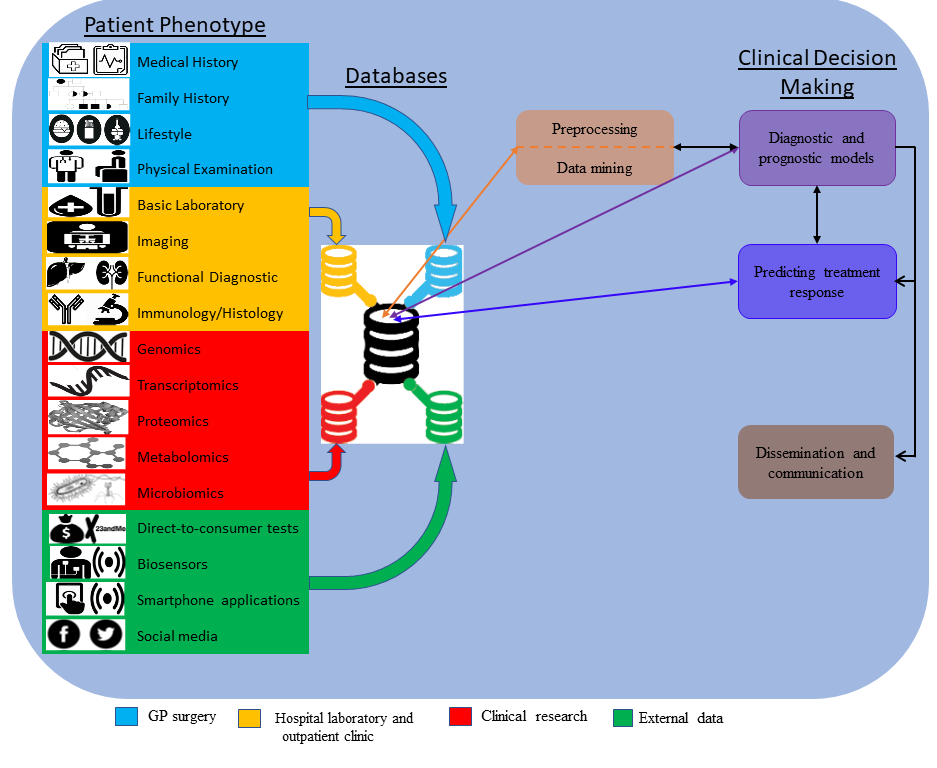
The Multifaceted Nature of Precision Medicine
Dr. Raymond Hugo Henderson – Senior HTA Manager, Salutem Insights
Precision medicine revolves around genomic disease classification but also involves disciplines like pathology, bioinformatics, and statistics. Figure 1 illustrates its components: clinical observations, research data, and external sources like personal genomics and smartphone apps, compiled into large datasets. These are analysed using machine learning to unveil disease patterns, interpreted by healthcare teams.
The aim is a dynamic healthcare system aiding individualized decision-making. Patient collaboration is key; their data informs interventions and may be anonymized for research. The fusion of ‘omic technologies, digital health data, and AI supports precision medicine, although some areas like proteomics and metabolomics are still emerging. Nevertheless, linking genomic and transcriptomic data has shown clinical promise, particularly in cancer.
Benefits of Precision Medicine
Precision medicine is applicable in a wide variety of disease domains including oncology, cardiology, neurology, immunological disorders, metabolic disorders, infectious diseases, and psychiatry. Some of the benefits of precision medicine include:
1. Improved Patient Outcomes: Precision oncology medicines when benchmarked against the European Society of Medical Oncology Magnitude of Clinical Benefit Scale (MCBS), the CDx-oncology medicine combination can deliver more clinically-meaningful benefit in both curative and non-curative settings.
2. Reduced Side Effects: Traditional “one-size-fits-all” treatments can lead to unnecessary side effects, but precision medicine can help reduce these side effects by targeting only the specific genetic mutations that are causing the disease.
Figure 1: The process of precision medicine

Data collected from GP surgeries, hospital and outpatient findings, clinical research, and external data are combined in a clinical prediction model to diagnose and treat disease.
3. Increased Efficiency: By using precision medicine, doctors can more quickly and accurately identify the best treatment options for a patient, which can reduce the time and costs associated with trial-and-error treatments. This is exemplified for diagnosing rare diseases in new-born infants by DNA sequencing, already proven to be cost-effective, with the likelihood that costs will decrease.
4. Early Diagnosis: With precision medicine, doctors can detect diseases earlier and more accurately, allowing for earlier interventions and better outcomes. Some examples include early detection of the BRCA 1 and 2 genes in breast cancer for monitoring and reshaping therapeutic strategies in Alzheimer’s Disease.
5. Targeted Treatments: Precision medicine allows for more targeted and effective treatment for diseases such as cancer, which can be caused by many different genetic mutations. Umbrella trials such as the I-SPY 2 trial demonstrate that a single cancer type, e.g. breast has many different mutations each of which can be targeted.
6. Personalization: Precision medicine approaches can provide a more personalized experience for patients, as the treatment and care plans are tailored to the individual’s genetic makeup, rather than a broad population-based approach. Providing clear and easily understandable information about the process and the potential outcomes can help patients feel more invested and involved in their own care.
7. Research Opportunities: Precision medicine allows for the better understanding of the genetic, environmental and lifestyle factors that contribute to disease which can be used to improve treatment options and advance medical research. The benefits to research are manifold including the faster identification of treatments, employs fewer number of patients in trials, encourages pharmaceutical companies to work together, and greater participation from patients who may not normally have access to the latest medicines.
Follow us on LinkedIn for more insights into precision medicine, upcoming research or to find out more about how we can support you in your Irish market access journey, contact us directly through our website here.